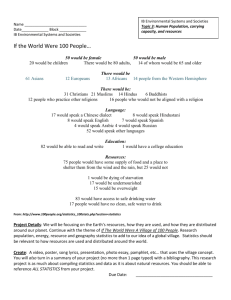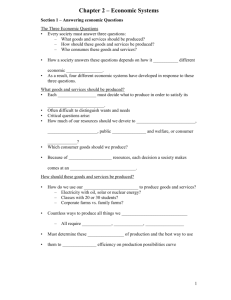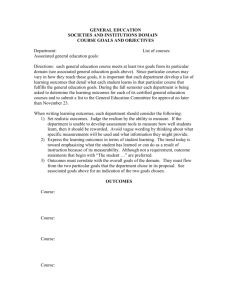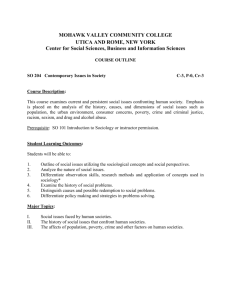Women's Status in Agricultural Societies
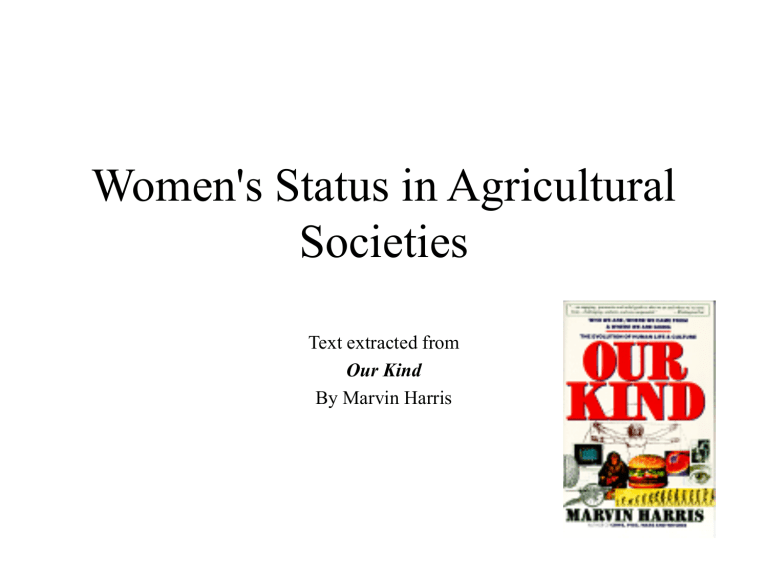
Women's Status in Agricultural
Societies
Text extracted from
Our Kind
By Marvin Harris
Men are larger, stronger than women
• Women 4.6 inches shorter than men on average
• Women have lighter bones and more fat
• Women 2/3 to 3/4 as strong as men
Men specialized in hunting large game
• Men were the big game hunters in 95% of bandand-village societies
• Male advantage in height, weight, brawn in use of hand-held hunting weapons
• Women less mobile when pregnant, lactating
– hunt smaller game, gather food (majority of diet)
Men usually specialists in weapons
• Men monopolized lethal weapons since paleolithic times:
– spears
– bow and arrows
– harpoons
– clubs
– boomerangs
• Men thus more dangerous, and more coercive in conflict
• "I'm a man. I've got my arrows. I'm not afraid to die"
-- !Kung hunter
Men trained to be warriors
• Warriors aggressive and fearless
• More capable of hunting and killing other human beings without pity or remorse
• Women warriors only significant in recent times with firearms: not muscle powered
• In Band and village societies, the more warfare there was, the more women suffered from male oppression.
Amount of war correlates to oppression of women
Bands of hunters and gatherers:
• !Kung (Kalahari desert, Africa) have little warfare
• Low population density hunters and gatherers
• Women have almost equal status as men
Aborigines (Australia):
• More warfare between bands
• Fairly low population density hunters and gatherers
• Captives from war cooked, eaten: mostly women and children
• Males get best food
• Men beat or kill wives for adultery
• Wives cannot do the same to men for adultery
Aborigine Women
• Aboriginal women do all the hard work
– Gather fruits, dig roots, chop larvae out of tree-stems
– Carry child on shoulders whole day
– Prepare food: beating, roasting, soaking fruits and roots
– Makes hut, gathers materials
–
Provide water and fuel
– Women carry all baggage when travel including children
• Men only carry light weapons, out in front when travel
Village Societies of Agriculturalists
Yanomami (Rainforest of Brazil, Venezuela)
• Boys train for war at early age, learn cruelty by practicing on animals
• Raids between villages common:
33% males die from armed combat
– competition for resources due to population pressure
• Polygynous:
– men can have many wives
• Wives beat or maimed for disobedience or adultery
– burned , ears chopped off
Village Societies of Agriculturalists
Nama (Papua New Guinea)
• Male initiation cult trains men as warriors
– and to dominate women
• Warfare between villages rampant:
– competition for resources due to population
Nama (Papua New Guinea)
• Males given bride at initiation –
– shoot her in the thigh with arrow
– to demonstrate "unyielding power over her"
• Women work in gardens, raise pigs, do all dirty work
• Men stand around gossiping
Nama (Papua New Guinea)
• "Women were severely punished for adultery by having burning sticks thrust into their vagina, or they were killed by their husbands; they were whipped with a cane if they spoke out of turn or presumed to offer their opinions at public gatherings; and were physically abused in marital arguments.
• Men could never be seen to be weak or soft in dealings with women. Men do not require specific incidents or reasons to abuse or mistreat women: it is part of the normal course of events; indeed, in ritual and myth, it is portrayed as the essential order of things."
--Daryl Feil, University of Sydney
Why Intense Warfare in
Agricultural Village Societies?
• New Guinea: high population leads to depletion of resources
• Forests depleted, burned, replaced by fields
• yams and pork replace wild animals and plants
• Selection for warfare: take over neighboring resources
Male Domination in Agricultural
Village Societies
• Male domination leads to female infanticide:
– Females can't become warriors
• sex ratios skewed toward males
• Female infanticide ultimately lowers population growth rate
Male Domination of Food
• New Guinea: male hunters, warriors
– monopolize meat (pork)
• Malnutrition:
– especially women, children and older men
• Women and children
– Eat more insects, frogs, mice, placenta, maggots
Patrilocality
• Patrilocality: women leave their family, village and move in with man's family
• Allows male raiding parties to be made up of blood relatives:
– trust in combat teams
• But who will look after land when men away?
– Women
• especially sisters: loyal
Iroquois longhouse
Matrilocality
• Matrilocality: men leave their family, village
– move in with woman's family
• Occurs in some chiefdoms where men gone on long raiding parties
– up to a year
• Example: Iroquois
• Women were in charge of home and fields:
– harvesting and storing crops
• Women in longhouse could withhold food for men's raids
– if didn't approve
Mohawk Warrior
Matrilocality
• Women's power not the opposite of mens:
– not equally cruel or humiliating. Why?
• Not because women less vicious:
– women often participate in torture
• Women cannot boss and degrade men
– when men have the weapons of war and warrior training .
Large Stratified Societies
• Effect of warfare less direct:
– most men not trained to be warriors
• Most men unarmed peasants
– also terrified of professional warriors
Type of Agriculture affects women's status
• West Africa
– Agriculture not dependent on men
– Women empowered
• North India
– Men’s strength required for plowing
– Women unempowered
• South India
– Women control agriculture
– Women empowered
West Africa
• Yoruba, Ibo, Igbo, and
Dahomey peoples
• Women's status strong:
• can own fields and crops
• Dominate local market
• Acquire wealth from trade
• Short-handled hoe used in agriculture
• No animal-plowed fields due to tse-tse fly
• Therefore women not dependent on men for agriculture
West Africa
• Men must pay bride-price to get married: Women valuable
• Male polygyny only with permission of senior wife
• Women participate in village councils and high state office
• Women mobilize as group to seek redress against mistreatment by men
North India
• Men have monopoly on oxdrawn plows
• Greater body strength: 15-
20% more efficient than women
• Advantage may mean difference between survival and starvation
• Even young men not strong enough to plow all day:
– short window of weather opportunity for plowing
Acid Burn Victim,
Bangladesh
North India
• Female infanticide common
• Dowries from women required for marriage
• Widows powerless: sometimes throw themselves on husbands funeral pyre
• Increasing incidence of intentional acid spraying
South India (Kerala)
• Rice paddy agriculture: doesn't need men's strength
• Women in charge of much agriculture
• Women have more freedom, status, social power
• True in other rice producing areas of
Southeast Asia, Indonesia
How did male dominance evolve in large agriculture societies?
• Men in charge of large plow animals
• Men thus drive animal-drawn carts when wheel invented, in charge of trade
How did male dominance evolve in large agriculture societies?
• Men thus in charge of bookkeeping, records
• Men thus became the scribes, accountants, literate
• Men thus became the philosophers, theologians, and mathematicians
How did male dominance evolve in large agriculture societies?
• Men also controlled warfare
• Men thus gained control over governments and state religions
"At the dawn of modern times men dominated politics, religion, art, science, law, industry, commerce, and the armed forces wherever people depended on animal-drawn plows for their basic food supply"
